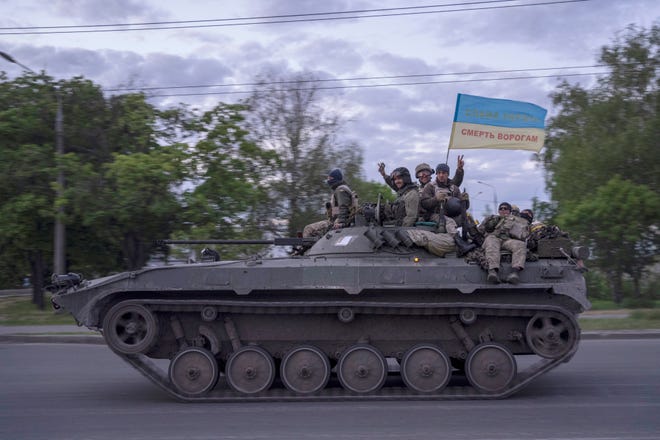
Ukrainian President Volodymyr Zelenksyy welcomed Poland's president to Kyiv on Sunday, saying the two nations are "defending a common universe called freedom and independence at a time when someone is committing barbarism of a cosmic scale."
Zelenskyy lauded Polish President Andrzej Duda for sheltering millions of Ukrainians, including women, children, the elderly and "everyone else" who fled to Poland in the three months since Russia's invasion began.
"Guest in the house, God in the house," Zelenskyy said in welcoming Duda to the Verkhovna Rada, Ukraine's parliament. "This is a Polish proverb with which I greet in Kyiv our guest, friend and brother."
Poland has accepted millions of refugees from Ukraine since the Russian invasion began three months ago. Meanwhile, Russian missiles and have been relentlessly flying into Ukraine's homes, schools, hospitals, museums, theaters, temples, "even cemeteries," Zelneskyy said.
"Eighty-eight days of madness," he said.
Duda arrived in Kyiv on Sunday, the first head of state to address Ukraine's legislative body since the war began.
"The Russian invaders failed to break you, and I deeply believe they never will," Duda said in a speech to Ukraine parliament.
MAPPING AND TRACKING RUSSIA'S INVASION: See where Russian forces are moving within Ukraine
Latest developments:
►Gov. Serhii Haidai of the eastern region of Luhansk said the sole functioning hospital in the city has just three doctors and enough supplies for 10 days.
►National security adviser Jake Sullivan said Sunday that the Pentagon and White House are working out details for the first Ukraine weapons shipment under the $40 billion aid package President Joe Biden signed Saturday.
►German chancellor Olaf Scholz has said he will "work actively" to enable grain exports from Ukraine and to supply fertilizer to Ukraine, Reuters reported. Russia has blocked Black Sea ports that are vital to exporting Ukrainian wheat and other crops.
►More than 900 American public servants, researchers and activists have been permanently banned from entering Russia in response to the United States’ sanctions on the nation and its support for Ukraine.

Fate of 2,500 Ukrainian holdouts in question after Russian siege
Russia says 2,500 Ukrainian fighters from the besieged Mariupol steel plant have been taken prisoner, raising concerns about their fate and the fate of the city that was home to 450,000 people before the war. The city is in ruins after weeks of shelling, and more than 20,000 residents feared dead. All but an estimated 100,000 survivors have fled.
The Azovstal steel plant for weeks was the last defense holdout in Mariupol and became a symbol of Ukrainian tenacity. Now family members of the fighters, who came from a variety of military and law enforcement units, have pleaded for the Russians captors to threat them as prisoners of war and eventually returned to Ukraine.
Deputy Prime Minister Iryna Vereshchuk said Ukraine “will fight for the return" of all of them. Denis Pushilin, the pro-Kremlin head of the self-proclaimed Donetsk People’s Republic, vowed the fighters would face tribunals.
Thousands of buildings destroyed as war rolls on
In the nearly four months since Russia began its invasion of Ukraine, its forces have damaged and destroyed thousands of buildings, including cultural sites, hospitals, schools and residences, and Ukrainian officials are taking stock of the damage. President Volodymyr Zelenskyy said in his nightly address Saturday that nearly 2,000 educational institutions had been destroyed by Russian forces since the invasion began Feb. 24.
"This is a colossal scale of losses," he said.
A Russian missile strike in Lozova in the Kharkiv Oblast region damaged more than 1,000 apartments on Friday, Mayor Serhiy Zelensky said
In Ukraine's second-largest city of Kharkiv, from which Russian forces withdrew last weekend after months of bombardment, about 30% of about 8,000 residential high-rises were "more or less destroyed," Ukraine's Center for Strategic Communications and Information Security said in a Telegram post.
Ukraine extends martial law, general mobilization
Ukrainian lawmakers on Sunday extended by 90 days both the general mobilization of forces and a decree of martial law. President Volodymyr Zelenskyy requested the extension until Aug. 23, saying a counteroffensive would take time, according to Ukrainian media startup Hromadske International.
Fedir Venislavsky, Zelenskyy's representative in the Constitutional Court, said the martial law order could be lifted at any time by the Rada, the Ukrainian parliament, according to Ukrayinska Pravda.
British military: Russia has deployed its 'Terminator'
Russian Terminator tank support vehicles have rolled into the war in Ukraine, according to the latest assessment from Britain's Defense Ministry. The company of BMP-T Terminators has "likely been deployed to the Severodonetsk axis of the Donbas offensive," the ministry tweeted on Sunday. Severodonetsk is a key city in the Donbas region, which Russia aims to control.
The presence of the tanks suggests that the Central Grouping of Forces (CGF) is involved in this attack, which is the only formation fielding this vehicle.
"CGF previously suffered heavy losses while failing to break through to eastern Kyiv in the first phase of the invasion," the ministry said. The vehicles actually protect the Russian army's battle tanks, and were developed for that role after the Afghan and Chechen wars, according to the ministry.
"The Severodonetsk area remains one of Russia’s immediate tactical priorities," the ministry said. "However, with a maximum of ten Terminators deployed they are unlikely to have a significant impact on the campaign.
– Katie Wadington
Ukrainian troops say they destroyed a Russian battalion tactical group
Ukraine's 30th Mechanized Brigade said Saturday it had "destroyed" a Russian battalion tactical group as it attempted to make a crossing of the Seversky Donets River, a major obstacle for the Russians in their focus on the eastern region.
Ukraine's forces have destroyed bridges to complicate the effort, forcing Russians to build pontoon bridges to cross, The New York Times reported.
The 30th Mechanized Brigade said it had "dealt a significant blow" to Russian forces attempting to cross the river.
"As a result, the Russians lost considerable strength – at least one battalion tactical group, pontoon bridge equipment was disabled during the forcing of the river, destroyed several units of equipment and several dozen personnel," it said in a Facebook post.
Concern for POWs after Russia takes Mariupol steel mill
Concern was mounting for Ukrainian fighters who became prisoners at the end of Russia’s brutal three-month siege of Mariupol as a Moscow-backed separatist leader vowed they would face tribunals. Russia claimed full control of the Azovstal steel plant, which for weeks was the last holdout in Mariupol and a symbol of Ukrainian tenacity in the strategic port city, now in ruins with more than 20,000 residents feared dead. Its seizure delivers Russian President Vladimir Putin a badly wanted victory in the war he began in February.
The Russian Defense Ministry released video of Ukrainian soldiers being detained after announcing that its forces had removed the last holdouts from the plant’s extensive underground tunnels. Denis Pushilin, the pro-Kremlin head of an area of eastern Ukraine controlled by Moscow-backed separatists, claimed that 2,439 people were in custody. He said on Russian state TV that the figure includes some foreign nationals, though he did not provide details.
Family members of the steel mill fighters, who came from a variety of military and law enforcement units, have pleaded for them to be given rights as prisoners of war and eventually returned to Ukraine. Deputy Prime Minister Iryna Vereshchuk said Saturday that Ukraine “will fight for the return” of every one of them.
What the US aid to Ukraine covers
With the additional $40 billion in aid money to Ukraine that President Joe Biden signed on Saturday, the combined $53.7 billion in total aid sent is about 81% of Russia’s 2021 defense budget. It’s also more than one-quarter the size of Ukraine’s pre-war economy.
That money includes amounts to directly aid Ukraine's governmental functions, supply emergency food assistance, increase U.S. crop production to make up for global food shortages and provide for the up to 100,000 Ukrainian refugees who will arrive in the U.S.
“The cost of this fight is not cheap,” Biden said when he made the funding request to Congress, “but caving to aggression is going to be more costly if we allow it to happen.”
Read more about the money, who pays for it and how it compares.
– Maureen Groppe
Contributing: The Associated Press










